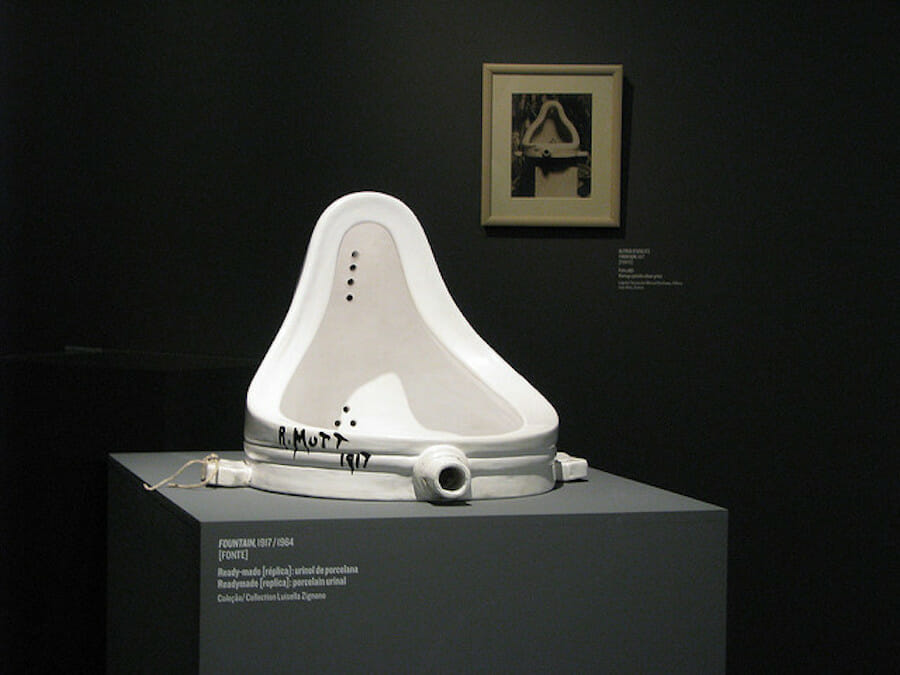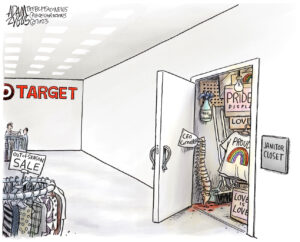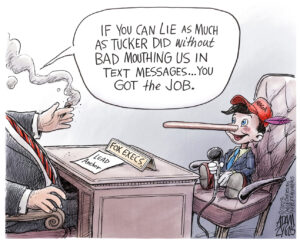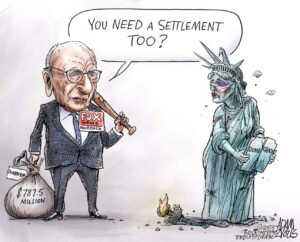Not a Paying Customer? Go Shit Somewhere Else.
Maybe on the streets, and good luck with the cops. Public (in-)convenience: Twentieth-century artist Marcel Duchamp understood the impact of bringing bathroom culture into the public view, quite literally. Pictured is a replica of Duchamp's famous "Fountain" (1917), a found-object piece consisting of a porcelain urinal he signed with the pseudonym "R. Mutt." (Joana Rangel / Flickr / CC BY 2.0)
Public (in-)convenience: Twentieth-century artist Marcel Duchamp understood the impact of bringing bathroom culture into the public view, quite literally. Pictured is a replica of Duchamp's famous "Fountain" (1917), a found-object piece consisting of a porcelain urinal he signed with the pseudonym "R. Mutt." (Joana Rangel / Flickr / CC BY 2.0)
Decent public bathrooms, and for that matter, public showers, ought to be free in all our cities and larger towns. That would be just one elementary kind of social democracy in this country. If we can afford endless wars and public bailouts for a rogue regime of banks and corporations, we can surely afford toilets, soap and water for we, the people.
Slaves gained freedom from masters, women gained freedom to vote, gay people gained freedom to marry in legal equality—or to refuse the legal bonds of marriage while still defending social equality beyond marriage. So all of us can still improve our public life. We would all gain in public relief of common animal needs, and it would not reduce our full humanity even by a fraction.
Megyn Kelly, however, thinks otherwise. Her tinsel star has risen from the depths of Fox News to the heights of NBC. After the April 12 arrests of two young black men in a Starbucks in Philadelphia, after nationwide protests and threats of a boycott, and after Starbucks suspended business for employee training sessions, Kelly was roused to a righteous cause: namely, defending the right of paying customers—and only paying customers—to use Starbucks restrooms.
The manager in the Philadelphia incident, who has since been fired, told the two men they could not use the restroom without buying a product. They chose to sit and wait for friends at their table, and the manager called the cops. They did not resist arrest, which was recorded and widely broadcast. Neither of the men looked like they had been sleeping rough on the streets, and they kept their dignity and composure.
Kelly made a fast and racist leap from these two gentlemen to a fantasy of a mob of homeless, diseased and addicted people crossing the class barrier to use restrooms in upscale coffee shops—because race is one of the habitual ways we live out the class system in this country. I must note that Philly was my home for decades, and I lived a short walk from where that Starbucks now does business.
As noted in a 2018 report on this country’s most segregated cities:
Today, about 43% of the City of Brotherly Love’s population lives in a racially homogeneous neighborhood, about 10 percentage points higher than the average across the 100 largest U.S. metropolitan areas. Of the city’s black population, 15.6% both earn poverty wages and live in high poverty neighborhoods, compared to less than 1% of the city’s white population.
That’s the reality for black Philadelphians. The predictable Fox News editorials could be printed on endless streams of toilet paper, except we now get this particular message from the classier neighborhood of NBC. Exercising her right to fill living rooms with cascades of caca, and to turn each news cycle into a theater of the absurd, Kelly recently opined on her “Today Show” program:
They’re allowing anyone to stay and use the bathroom even if they don’t buy anything, which has a lot of Starbucks’ customers saying, “Really?”
Really? We might wonder whether Kelly pulls that kind of stuff out of her butt. Only in passing did she raise a question about the way we divide private and public space into private and public property. Kelly is a mouthpiece for a dominant ideology, and this alone makes her comments worth our time. Her question was rhetorical; she had already answered it:
Because now the Starbucks are going to get overwhelmed with people, and is it really just a public space or is it not?
Let’s take her question seriously, because in some cases, the answers will not be simple. But in other cases, we have legal precedents and even federal laws that were not simply gifts of goodwill from Congress and the Supreme Court but were won through long periods of class struggle and through social movements involving civil resistance against racism. A private business still has a general right to refuse service to people who are disruptive or dangerous, but not for reasons of race, sex, age and disability. Sexual orientation and gender identity are protected only in some places.
Kelly is not worried that a small, independent coffee shop in a working-class neighborhood might get “overwhelmed with people” of the wrong kind. She is in a panic precisely because the Starbucks brand is an upscale lifeboat of good taste and good manners, especially when the classy Titanic has already struck the iceberg. She deserves one of those lifeboats and assumes most people of her class do, too. Her world is rocked by the swift decision of Starbucks executives to compromise with people she regards as a potentially dangerous mob. Even Jenna Bush Hager argued the case for kindness on Kelly’s program and said her local Starbucks gives a break to a few homeless people.
Kelly was not persuaded, and suggested that churches exist to provide that kind of charity, not a big chain of coffee shops. She did not suggest that a corporation might choose the philanthropy of providing housing for the homeless, or just clean toilets and showers for anyone who can’t afford a $5 cup of coffee. Kelly continued:
And it’s a question about whether a commercial establishment is that place. … For the paying customers who go in with their kids, do you really want to deal with a mass of homeless people or whoever is in there—could be drug addicted[. Y]ou don’t know when you’re there with your kids paying for the services of the place.
That division of labor between unreliable philanthropy and unreliable charity never really gets spelled out. Our class divisions never truly get mapped as a social minefield for the poor, the jobless, the low-wage workers and the outright homeless. The richer white folks are likelier to regard the trenches of class division as flyover country as they dine and shop in ascending degrees of class distinction.
Private and public places must remain contested territory when private property is open for business to the general public. When and where there may be doubt, Kelly defends the right of proprietors to draw their own line and tell unwanted members of the public to get out.
If we deprive some people of secure and well-maintained bathrooms open to the general public, then they are forced to use bathrooms of businesses such as Starbucks—or else use streets and parks, and risk dealing with cops. This problem won’t go away, any more than the poor and despised can be wished out of existence. Not in a wealthy country whose gross domestic product includes the homeless and the crap we encounter on streets, parks and beaches.
Sure, there is the issue of tax dollars and public funding. God forbid we should flush our hard-earned money down a public toilet. Public bathrooms would require real public funding and workers with living wages. If we want the dirty, despised and even dangerous jobs done for the public good, then the public must be good enough to pay for jobs well done. Corporate executives are lauded as “job providers,” so why oppose the opportunity to hire security and maintenance staff for public bathrooms beyond private businesses open to the public?
We should worry much less about rapists, criminals and terrorists swarming over our borders and show much more respect to migrant workers. Indeed, those workers also deserve safe housing and clean bathrooms in fields and factories. That respect must extend to people in trouble, those who may not be able to hold a job due to all-too-human problems such as homelessness, mental illness and addiction.
That much—and, let’s be real, that little—does not require a nation of saints, or even a nation of social workers. It does not require a lockstep march backward under Soviet central committees, nor a lockstep march into a future of technocratic totalitarianism. Our choice is not between an out-of-date Kremlin and an up-to-date Davos. We are not talking about some utopia far over the horizon, but about common decency, here and now.
The whole cost could easily be paid by taking a fraction from the vast and unaccountable military budget. A few of the more honest public servants admit that trillions of bucks go mysteriously missing. Yes, trillions, not just billions. See Lee Camp’s report, published recently by Truthdig.
I remember the days when people with AIDS carried maps of places we could go in an emergency to use the toilets. Beelines or bust! Some of us did our best with adult diapers, because diarrhea was a fact of our lives, especially with the harsher early meds. This remains a fact of life for many other people with chronic health problems—just in case you care to distinguish between the diseases of respectable people and the diseases of social pariahs. And if you think you can catch AIDS from toilet seats, catch up with the science.
In our great meritocracy, some people merit toilets away from home (assuming they have homes other than tents and streets and underpasses), but not others. Not those others who may be drifters, whores, junkies, crazies or the riffraff who are barely toilet-trained. That amounts to a public policy of cruelty and deprivation and turns workers behind counters into agents of social hygiene. After all, to keep their jobs they may be following orders from their bosses, who in turn can always claim they put customer comfort and public safety first.
Life, liberty and the pursuit of happiness? Oh, perishing republic! Irony too heavy? Don’t blame the messenger. Our crappy public life has certain rules, as strict as the etiquette at the court of Versailles under the divine right of kings.
In fact, those powdered and bewigged courtiers had few places to relieve themselves at public events in the Palace of Versailles, and they often did their business in stairwells. If they were lucky, they could find a servant to fetch a chamber pot, or else take a piss in the fabulously manicured gardens. The aristocratic stench grew so strong that King Louis XIV commanded the hired help to sweep out the shit at least once a week and protect the precious potted orange trees from being used as pissoires. Don’t take my word for it; check out a bit of history here. The servant problem in France continued under the following royal regimes and was one factor in the French Revolution.
Let’s not pretend that class consciousness is the mark of Cain only for the proles and the underworld, because our rulers demonstrate that they are highly class-conscious in their own right, from the commanding heights of wealth and power. Nice to have the public order spelled out by an expensively groomed talking head on TV.
Back in the last decade of the 20th century, the growing number of women in Congress forced that boys’ club to add more restrooms for their newly arrived female colleagues. Of course, now we have the raging battles over the right of trans people to use the bathrooms of their choice, which has become a new line drawn in the sand by cultural warriors against the gender-benders. A rising tide of common sense will wash that line away.
A very few open socialists and a few sturdy women in Congress could tackle this issue as a small reform in public policy. They would be up against a bipartisan consensus that would favor turning this reform into yet one more “public/private partnership.” Starbucks stirs up the recent round of arguments, but it was forced to change company policy by public threats of boycotts. Let’s not get stuck in praise of the CEO’s apology and the limited change in business as usual. That misses all the bigger issues. Entirely.
“Public/private partnerships” are a neoliberal nostrum. Private profits will still be extracted, even from public toilets in private businesses, and private profits can even be extracted from civic plans to fund and maintain public bathrooms in the public sphere. If the public pays only a dime per crap, then someone would still be eager to extract their 10 percent from every flush. Some shiny new startup in Silicon Valley could even provide Congress with the data required to nickel and dime the public for each bar of soap and each roll of toilet paper. Unless it’s entrepreneurial, it’s not American.
To hell with that. We’re taking about a public commitment to a public service. Every such small reform also requires this simple public demand on the very rich and the corporations: “Pay Your Taxes.” If we, the people, are serious about that demand, we need a national tax plan scaled to real incomes and profits.
One thing leads to another, as the career pols always caution the public, and we would then be on the slippery slope to socialism. This is all too familiar from old debates between capitalist economists. John Maynard Keynes, for example, proposed mild reforms to save capitalism from recurrent catastrophes. They worked, more or less, for a time. The “libertarian” economists weren’t buying it though, because their first concern was the unregulated liberty of capitalists. For that reason, Friedrich Hayek wrote “The Road to Serfdom,” a polemic against the Keynesian program. Never mind that capitalism creates millions of up-to-date serfs and armies of toilet-trained wage slaves. Those who do not rise on the wheel of fortune must go under and be crushed.
The usual “public/private partnership” schemes do not go to the root of divisions in capitalist ideology and in the built environment we take for granted as an act of God. Starbucks, before and after the news cycle and busted attention spans, has provided one useful corporate example of a small, neoliberal policy change. And that is all. This example directly concerned two black men and reflexive racism. So we must remember the sit-ins at lunch counters during the civil rights movement of the previous century, when black people dared to order cups of coffee under a Southern Jim Crow regime. After arrests and public storms, Supreme Court decisions finally laid down the law. A privately owned business serving the public cannot, in fact, reserve a sovereign right to deny service to people of color. Otherwise, we may have a republic of racist private profiteers, but not a democracy worthy of all citizens.
If we want fully funded public services, we are talking about basic social democracy and radical reforms. Not just about corporate decisions made from the top down, however philanthropic they may be. And not just about faith-based charity. This country has plenty of churches, but not nearly enough to provide public toilets and showers to people in trouble. More to the point, she has only a vague notion of this nation’s racial history and the hard-won gains in legal and human rights.
Business owners recently surveyed in Costa Mesa, Calif., opposed a measure to provide public bathrooms to the homeless by 80 percent. This is a not-in-my-backyard reflex, bound, in this case, to giving a thumbs-down to any rise in taxes. In fact, public bathrooms would mean that many fewer homeless people would be using their business bathrooms. If public bathrooms create jobs for security and maintenance staff, as they surely should, then any tourists to the city would also be better served. After the initial cost, that means a rise in overall revenues to Costa Mesa.
Sure, some people just want the homeless gone. Well, warmer climates will draw from colder climates a higher number of people in trouble. I once lived and worked in Key West, Fla., and observed a similar problem, though on a much smaller scale. Here’s the deal: Some cities and states to which the homeless migrate in high numbers are either tackling the problem with common sense and compassion, or they are retreating from reality and hoping to build Trump’s “beautiful wall” in their own backyard.
The towns and cities that struggle to provide basic goods and services to the middle class may feel no responsibility to the poor at all. Civic budgets are burdened by the consequences of crony capitalism and the corporate command economy. Roads, tunnels, bridges and even public water systems are breaking down around the country, and a federal jobs program to upgrade our infrastructure should be part of a 21st-century New Deal.
Some of those jobs would lift the jobless from homelessness, though we also need a truly public health care system, including programs that meet alcoholics and addicts where they are. Brick-and-mortar neighborhood clinics deserve support, but mobile bathrooms and primary care vans are also necessary. When progressive city councils step up to such responsibilities, they deserve praise. But those cities should not be subsidizing the irresponsibility of other public officials who just hope people in trouble take the next bus out of town.
Los Angeles has one of the worst and biggest skid rows—and homeless encampments scattered throughout surrounding areas—in the nation. Near my home, I pass by tents and cardboard boxes that may be a small refuge for people in trouble. We have to stop looking at their makeshift homes as mere litter-boxes, because some take pride in keeping their areas neat and clean. Sometimes I stop and talk to these people and offer a few bucks or some food. Not all accept, and a few let me know a handout is beneath their dignity. They have a point.
And because I am not a saint or a professional revolutionary, I can only make the smaller efforts to remain human. I joined small groups back in Philly that founded clean-syringe and harm-reduction sites on city streets for injection-drug users, and others of us were pitched in police vans when we demanded housing for the poor and homeless. Sure, I recommend civil disobedience, but that is just one item in our toolkits for change. We can also vote against reckless and irresponsible career politicians. Still, even basic democracy now requires a social revolution in this country. We can judge “public/private partnerships” case by case, but they can do more good for private interests than for the public. Basic social democracy will not be heaven on earth, but other countries practice common sense and have a public record of common humanity in their public policies. That is not the road to serfdom, but rather the way to a genuine commonwealth.
We need local programs to house and help the poor and the homeless. We also need a national commitment to end structural poverty, and we need federal protection of people who are too often considered throwaways. Everyone deserves a chance and a choice to get the hell out of town if their families and neighbors offer no help at all or treat them as people who deserve a scarlet letter. We will need federal funds and laws so more of the homeless can find homes closer to kin and places of origin, and federally funded job programs for those able to work. This was one of the success stories during the Great Depression of the 1930s, and the New Deal was one kind of social democracy. We can do better now. The devolution of the homeless problem in the 50 states means we are not, in fact, the United States. Not on this issue, and not on many others.
Hey, there ought to be a law, right? As Auden once noted, “We are still barbarians.”
Your support matters…Independent journalism is under threat and overshadowed by heavily funded mainstream media.
You can help level the playing field. Become a member.
Your tax-deductible contribution keeps us digging beneath the headlines to give you thought-provoking, investigative reporting and analysis that unearths what's really happening- without compromise.
Give today to support our courageous, independent journalists.






You need to be a supporter to comment.
There are currently no responses to this article.
Be the first to respond.